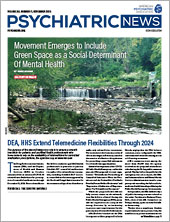Psychiatrists, like most health care professionals, are bound by confidentiality under HIPAA and privacy laws. Patients share very personal information, and breaking confidentiality can negatively impact the psychiatrist/patient relationship and impede patients’ ability to seek the care they need. But what happens when patients share information requiring psychiatrists to report under the duty to warn/protect requirements in their state? Psychiatrists may find themselves in an ethical dilemma and unsure how to proceed.
Each state has its own duty to warn/protect criteria, which fall into one of three categories: mandatory reporting; permissive reporting, meaning a psychiatrist may report under the statute without negative repercussions; or no duty to report.
Examples of Mandatory Reporting
•
The patient deemed a danger to self or others.
•
Suspected or evidence of abuse to elders, vulnerable adults, and minors.
•
Lack of capacity or impairment to drive safely.
•
Extreme Risk Protection Orders (red flag laws).
What happens when a patient tells his or her psychiatrist of threats or potential threat of harm or abuse sustained by third parties? If a patient reports crimes or potential threats made by a third party to others, not involving the patient, typically there is no duty to report. This information may be deemed hearsay since the patient is relaying information from or about a third party. However, if the psychiatrist has a concern for public safety, such as a patient’s reporting a relative who may be planning a mass shooting, it is best to consult with an attorney immediately in the interest of public safety.
If the patient reports that a friend or family member was the victim of abuse as a child (for example, a patient reports that his or her spouse was the victim of child abuse), the psychiatrist may recommend that the patient encourage the friend or family member to report the abuse; however, it is unlikely that the psychiatrist has a reporting obligation. Again, when a psychiatrist is unsure about what to do under the circumstances, consulting an attorney or risk management professional is best.
Risk Management Considerations
Psychiatrists must be upfront with their patients regarding the legal and ethical duties they are required to follow, including situations involving a duty to protect/warn. Patients should understand that conveying certain information may trigger a duty to report per state/federal statutes and ethical obligations under medical licensure regulations and to alert others to a potential harm to the patient or others the patient may harm. As a result, here are risk management considerations in reducing the risk when considering reporting under the duty to warn laws.
•
Consult an attorney, risk management professional, or Ethics Committee of APA or the AMA for guidance on reporting obligations.
•
Use good documentation techniques for memorializing the information in patients’ records. For extremely sensitive information, consider documenting it in a psychotherapy note kept separate from the medical record.
•
Consider the policy of “do no harm.” Will reporting the event create an increase in mental stress to your patient? Will reporting create a potential threat by a third party for injury to your patient? Is there a public safety concern?
•
Does the actual or potential harm involve a child or vulnerable adult?
•
Consult federal, state, and local statutes for guidance within your state. ■
This information is provided as a risk management resource for Allied World policyholders and should not be construed as legal or clinical advice. This material may not be reproduced or distributed without the express, written permission of Allied World Assurance Company Holdings, Ltd, a Fairfax company (“Allied World”). Risk management services are provided by or arranged through AWAC Services Company, a member company of Allied World. © 2023 Allied World Assurance Company Holdings, Ltd. All Rights Reserved.

